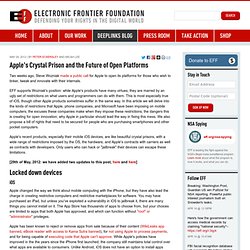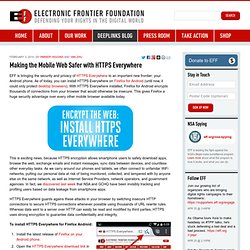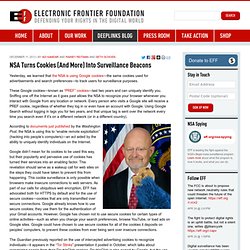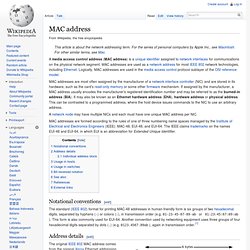

We just launched HTTPS Everywhere on... - Electronic Frontier Foundation (EFF) One Limitation. Apple Locking out Mozilla. Apple's Crystal Prison and the Future of Open Platforms. Two weeks ago, Steve Wozniak made a public call for Apple to open its platforms for those who wish to tinker, tweak and innovate with their internals.

EFF supports Wozniak's position: while Apple's products have many virtues, they are marred by an ugly set of restrictions on what users and programmers can do with them. This is most especially true of iOS, though other Apple products sometimes suffer in the same way. In this article we will delve into the kinds of restrictions that Apple, phone companies, and Microsoft have been imposing on mobile computers; the excuses these companies make when they impose these restrictions; the dangers this is creating for open innovation; why Apple in particular should lead the way in fixing this mess.
We also propose a bill of rights that need to be secured for people who are purchasing smartphones and other pocket computers. [29th of May, 2012: we have added two updates to this post, here and here] Locked down devices iOS. Making the Mobile Web Safer with HTTPS Everywhere. EFF is bringing the security and privacy of HTTPS Everywhere to an important new frontier: your Android phone.

As of today, you can install HTTPS Everywhere on Firefox for Android (until now, it could only protect desktop browsers). With HTTPS Everywhere installed, Firefox for Android encrypts thousands of connections from your browser that would otherwise be insecure. This gives Firefox a huge security advantage over every other mobile browser available today. Click below to install HTTPS Everywhere in Firefox for Android: This is exciting news, because HTTPS encryption allows smartphone users to safely download apps, browse the web, exchange emails and instant messages, sync data between devices, and countless other everyday tasks. HTTPS Everywhere guards agains these attacks in your browser by switching insecure HTTP connections to secure HTTPS connections whenever possible using thousands of URL rewrite rules. NSA and GCHQ target 'leaky' phone apps like Angry Birds to scoop user data.
The National Security Agency and its UK counterpart GCHQ have been developing capabilities to take advantage of "leaky" smartphone apps, such as the wildly popular Angry Birds game, that transmit users' private information across the internet, according to top secret documents.

The data pouring onto communication networks from the new generation of iPhone and Android apps ranges from phone model and screen size to personal details such as age, gender and location. Some apps, the documents state, can share users' most sensitive information such as sexual orientation – and one app recorded in the material even sends specific sexual preferences such as whether or not the user may be a swinger. Many smartphone owners will be unaware of the full extent this information is being shared across the internet, and even the most sophisticated would be unlikely to realise that all of it is available for the spy agencies to collect. Millennial Media did not respond to a request for comment. Firefox Browser for Android.
Https-everywhere-android. Location Tracking: A Pervasive Problem in Modern Technology. NSA Turns Cookies (And More) Into Surveillance Beacons. Yesterday, we learned that the NSA is using Google cookies—the same cookies used for advertisements and search preferences—to track users for surveillance purposes.

These Google cookies—known as “PREF” cookies—last two years and can uniquely identify you. Sniffing one off the Internet as it goes past allows the NSA to recognize your browser whenever you interact with Google from any location or network. Every person who visits a Google site will receive a PREF cookie, regardless of whether they log in or even have an account with Google. Using Google Search without logging in tags you for two years, and that unique tag is sent over the network every time you search even if it’s on a different network (or in a different country).
According to documents just published by the Washington Post, the NSA is using this to “enable remote exploitation” (hacking into people’s computers)—an act aided by the ability to uniquely identify individuals on the Internet. Anonymous User Tracking? MAC address. A media access control address (MAC address) is a unique identifier assigned to network interfaces for communications on the physical network segment.

MAC addresses are used as a network address for most IEEE 802 network technologies, including Ethernet. Logically, MAC addresses are used in the media access control protocol sublayer of the OSI reference model. MAC addresses are most often assigned by the manufacturer of a network interface controller (NIC) and are stored in its hardware, such as the card's read-only memory or some other firmware mechanism. If assigned by the manufacturer, a MAC address usually encodes the manufacturer's registered identification number and may be referred to as the burned-in address (BIA).
It may also be known as an Ethernet hardware address (EHA), hardware address or physical address. A network node may have multiple NICs and each must have one unique MAC address per NIC. Notational conventions[edit] Address details[edit] Panopticlick. FASCIA: The NSA's huge trove of location records.